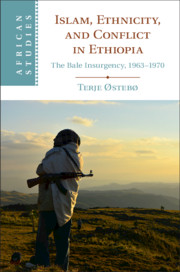Book contents
- Islam, Ethnicity, and Conflict in Ethiopia
- African Studies Series
- Islam, Ethnicity, and Conflict in Ethiopia
- Copyright page
- Dedication
- Contents
- Maps
- Figures
- Tables
- Acknowledgments
- Map
- 1 Introduction
- 2 Islaama Peoplehood and Landscapes of Bale
- 3 Conquest and Resistance
- 4 Bale at War
- 5 The Insurgency: Fighters and Fragmentation
- 6 Peasant Insurgency without Peasants
- 7 Land Tenure and the Land-Clan Connection
- 8 Christianity, Nation, and Amhara Peoplehood
- 9 Trans-local Dynamics: The Bale Insurgency in the Context of the Horn
- 10 Islaama vs Amhara and the Making of Local Antagonism
- 11 The Bale Insurgency, Islaama, and Oromo Ethno-nationalism
- 12 Conclusions
- Glossary
- References
- Index
- African Studies Series
10 - Islaama vs Amhara and the Making of Local Antagonism
Published online by Cambridge University Press: 28 September 2020
- Islam, Ethnicity, and Conflict in Ethiopia
- African Studies Series
- Islam, Ethnicity, and Conflict in Ethiopia
- Copyright page
- Dedication
- Contents
- Maps
- Figures
- Tables
- Acknowledgments
- Map
- 1 Introduction
- 2 Islaama Peoplehood and Landscapes of Bale
- 3 Conquest and Resistance
- 4 Bale at War
- 5 The Insurgency: Fighters and Fragmentation
- 6 Peasant Insurgency without Peasants
- 7 Land Tenure and the Land-Clan Connection
- 8 Christianity, Nation, and Amhara Peoplehood
- 9 Trans-local Dynamics: The Bale Insurgency in the Context of the Horn
- 10 Islaama vs Amhara and the Making of Local Antagonism
- 11 The Bale Insurgency, Islaama, and Oromo Ethno-nationalism
- 12 Conclusions
- Glossary
- References
- Index
- African Studies Series
Summary
The chapter circles back to the locality of Bale and to the role of local actors. Detailing the many different aspects of the local conflictual dynamics, it starts by revisiting the question of class. It explores in particular the relevance of class in relation to religion and ethnicity, arguing for interpretations that view these categories as interrelated. It connects the notion of peoplehood to a discussion of how the insurgents themselves formulated and articulated the movement’s objectives. It subsequently investigates the role of the highland activists, arguing that these were instrumental for further elaborating the movement’s ideological thinking and, moreover, that religion and ethnicity remained foundational in this regard. The questions of religion and ethnicity are further fleshed out in the chapter’s second part, which discusses how deeply affective and embodied the religious and ethnic dimensions were in the broader population, and how the insurgency represented an expression of deeply felt popular sentiments. The chapter also discusses how Amhara exceptionalism was articulated and experienced in Bale, focusing on the role of religion and ethnicity as integral to politics of domination. It demonstrates how this strengthened the notion of Islaama peoplehood in Bale, cementingantagonistic attitudes – eventually becoming manifest through the insurgency.
- Type
- Chapter
- Information
- Islam, Ethnicity, and Conflict in EthiopiaThe Bale Insurgency, 1963-1970, pp. 259 - 287Publisher: Cambridge University PressPrint publication year: 2020



